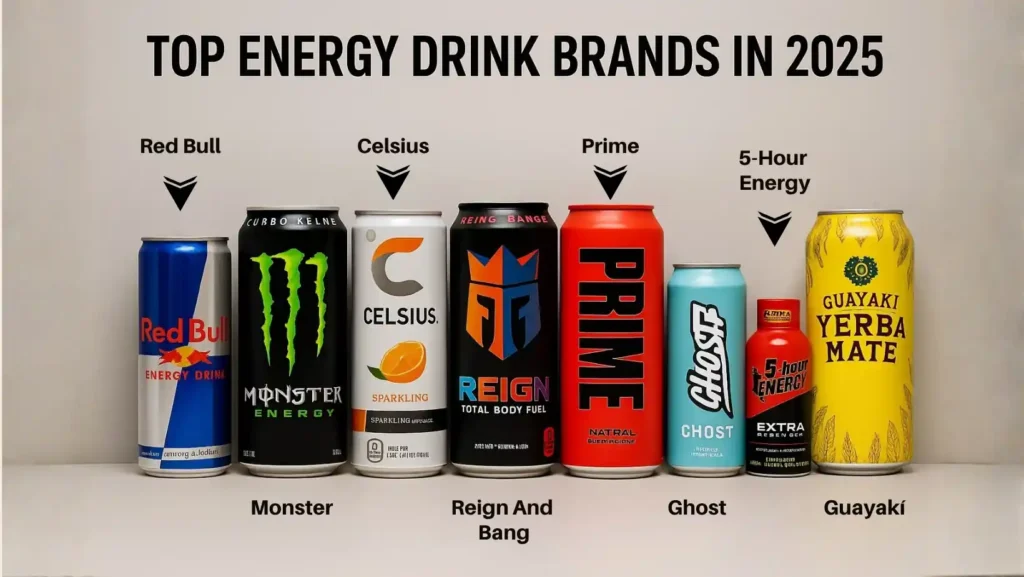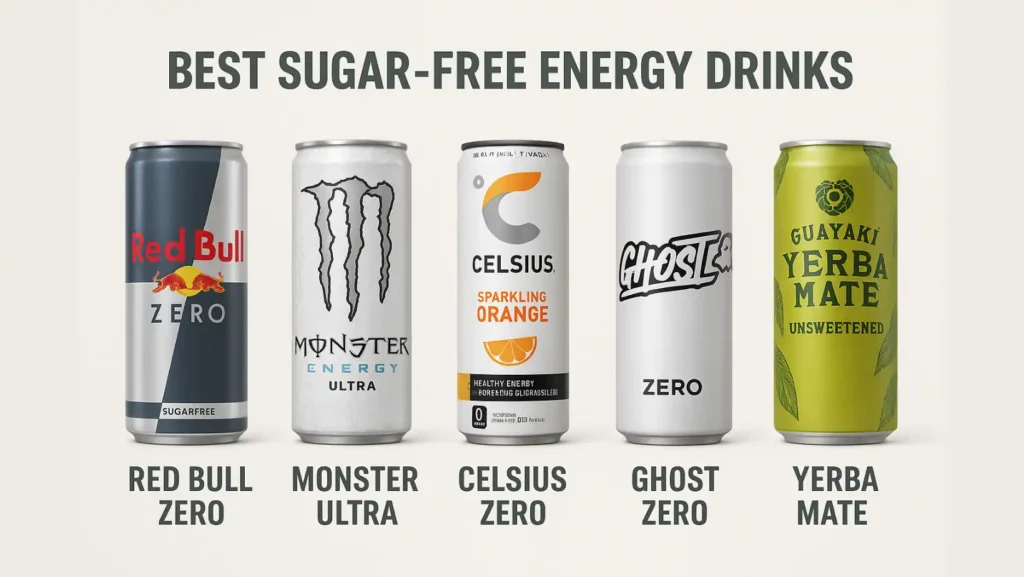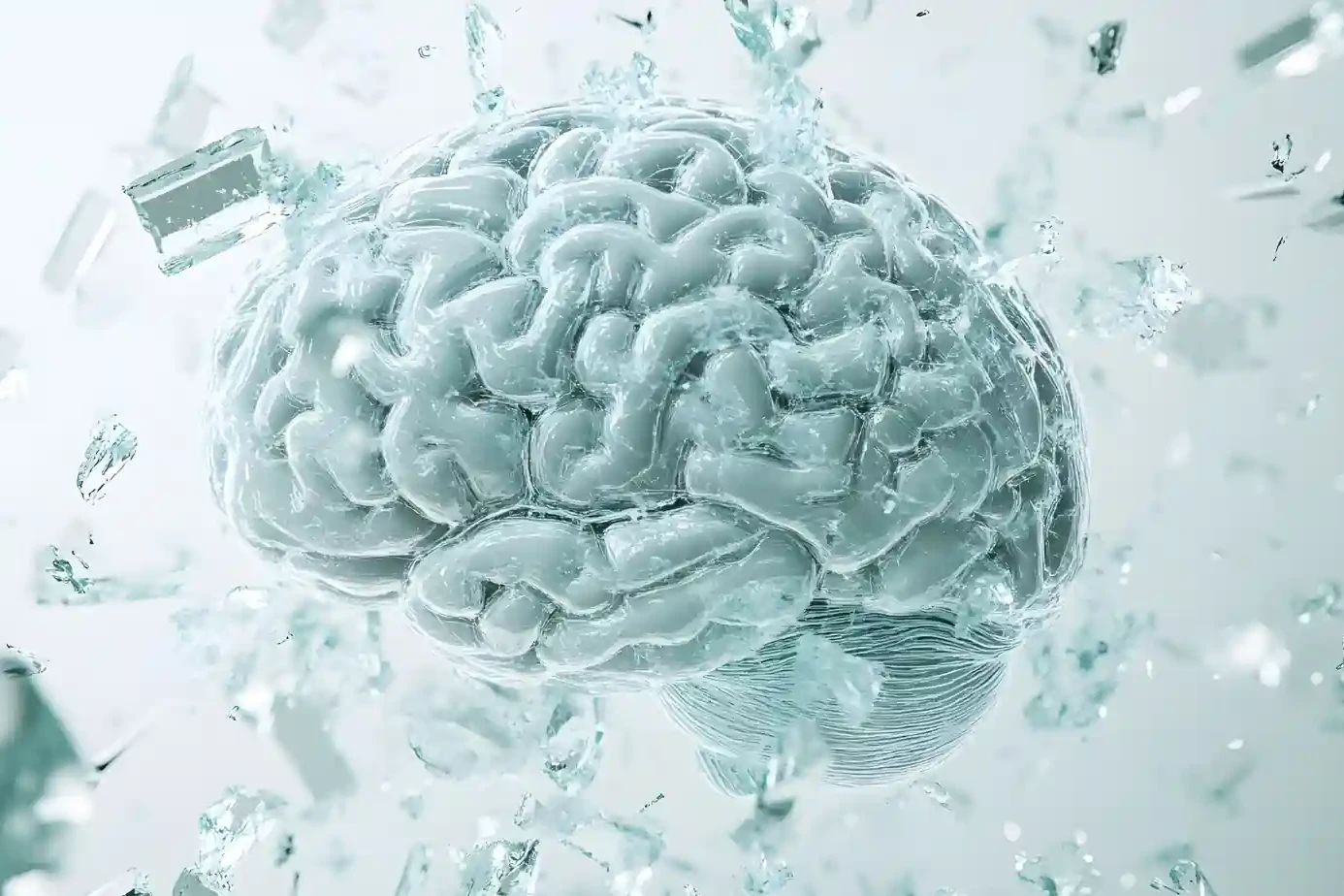Best energy drinks give you focus, steady energy, and simple labels. You want clean caffeine, smart ingredients, and a taste you can live with. You also want safe use. You do not want jitters or a crash. This guide shows you how to choose well for study, training, and long days.
Table of Contents
ToggleWhat Makes An Energy Drink The Best?
You need a drink that wakes your brain and supports your body. It should list caffeine per can. It should limit sugar. It should use vitamins that help your cells make energy. It should taste good enough so you can stick with it. When you choose like this, you get closer to the best energy drinks for your routine.
Ingredients That Enhance Alertness And Stamina
- Caffeine is the main driver. It blocks adenosine receptors in your brain. That lowers sleep pressure. You feel alert.
- Taurine is an amino acid. It may support nerve signaling and muscle work.
- Beta-alanine can support high-effort training.
- L-carnitine helps fat transport into mitochondria.
- B vitamins help you turn carbs and fat into energy.
- Electrolytes replace salts you lose in sweat.
- Nootropics like L-theanine can smooth caffeine edges. They can ease jitters in some users.
When you see these on a label, you are closer to the best energy drinks for performance.
Caffeine, Taurine, And B-Vitamin Synergy Explained
You get the sharp lift from caffeine. Taurine may aid calcium flow in muscle cells. That can help force output. B-vitamins like B6 and B12 run enzyme steps in energy release. Think of them as helpers. They do not add energy by themselves. They help your body use food energy faster. When a can balances these parts, you get one of the best energy drinks for focus and training.
How Sugar And Artificial Additives Affect Your Body
Sugar gives quick fuel. It also spikes blood sugar. Then levels can dip. That can trigger a crash. Many people feel sleepy later. Artificial sweeteners keep calories low. Some people feel stomach upset from them. Others feel fine. Colors and flavors add taste but bring no function. If you want daily use, pick low sugar. That keeps you aligned with healthy energy drinks that suit long-term goals.
Top Energy Drink Brands In 2025
You see many cans on shelves. You must filter by needs. You want steady focus at work. Or you want a strong push for the gym. Here is how you think through the top energy drink brands so your choice matches your goal.
Red Bull — The Classic Global Leader
You get moderate caffeine per small can. That suits short study sessions. It also suits light training. Sugar versions taste sweet. Sugar-free options cut the crash. Many students start here when they test what feels right. That is why people still rank it among the top energy drink brands. It also fits lists of best sugar-free energy drinks because of its zero-sugar option.
Monster — High-Performance Fuel For Athletes
You get larger cans. You get more caffeine in many lines. You also get many flavors. Some versions add BCAAs and electrolytes. You can pick sugar-free varieties to trim calories. For hard sessions, it works for many users. Read the label so you know your caffeine total. That is how you keep it within healthy energy drink habits.
Celsius — Thermogenic And Low-Calorie Favorite
Celsius markets fitness support. Many lines stay low in sugar or sugar-free. You get B-vitamins and caffeine that fit pre-workout timing. Many users like the light taste. It ranks high for the best low-calorie energy drink picks. It also shows up in lists of best sugar-free energy drinks thanks to its low-calorie focus.
Reign And Bang — Fitness-Focused Pre-Workout Energy
These lines target lifters and endurance fans. Many cans list high caffeine. Some add CoQ10 and BCAAs. This setup fits hard training blocks. It does not fit late-night study. Keep a water bottle with you. Plan your dose. That keeps your heart rate and sleep in check. Used well, they can sit among the best energy drinks for gym work.
Prime — Influencer-Powered, Hydration-Focused Drink
Prime built buzz with social media. Its energy line includes electrolytes. Caffeine is moderate to high. Taste profile leans sweet. Hydration mixes help on hot days. You still must count total caffeine from all sources. Fans include it in the top energy drink brands lists because it crosses sport and culture.
Ghost — Gamer-Friendly With Added Nootropics
Ghost leans into focus. Some versions add L-theanine and other brain support ingredients. That can help gamers and shift workers. Sugar-free lines keep calories low. Many users find the taste clean. Use earlier in your shift. That helps you protect your sleep later. It sits well in many best sugar-free energy drinks roundups.
5-Hour Energy And Guayakí Yerba Mate — Natural Caffeine Boosters
Shots give fast delivery in tiny bottles. They suit travel or tight breaks. Yerba mate is a plant tea from South America. It brings natural caffeine and polyphenols. The taste is earthy. If you like plant sources, this lane fits healthy energy drinks goals.
Both options serve different needs. You can keep a shot for emergencies. You can sip mate for a calm lift. Many users consider Mate a natural energy drink alternative for daily use.
Best Sugar-Free Energy Drinks
Top Zero-Sugar Options For Clean Energy
You want energy without sugar. You can choose zero lines from Red Bull, Monster, Ghost, and Celsius. You also find sparkling teas with no sugar. You keep calories near zero. You keep your teeth safer from sugar wear. That helps you place these as best sugar-free energy drinks for weight control and steady focus.
How Sugar-Free Energy Drinks Maintain Taste And Performance
Brands use sweeteners like sucralose and acesulfame K. These give a sweet taste with few or no calories. They do not cut caffeine effects. The performance comes from caffeine and other actives. If you need lasting focus, you can pick the best sugar-free energy drinks and still get results.
Hidden Sweeteners To Watch For (Sucralose, Aspartame)
You should scan labels. You may see sucralose, aspartame, or erythritol. Some people feel bloating or headaches. Others feel nothing. If you react, swap brands. Keep notes in your phone. That habit helps you lock in the best energy drinks for your body.
Best Low-Calorie Energy Drinks
Drinks Under 20 Calories For Weight-Conscious Users
You can find many cans with fewer than 20 calories. Look for zero sugar labels or light lines. These keep intake tight while you cut fat. Many users rate them as the best low-calorie energy drink pick. They pair well with walking and strength work. You can also use them during long meetings when snacks tempt you.
Ideal Low-Calorie Choices For Daily Energy Without Crash
Pick moderate caffeine per serving. Aim for 80 to 160 mg at a time. Spread servings if you need more. Add a protein snack. That blunts hunger. You stay steady. You protect sleep. With that setup, you get closer to the best energy drinks for daily life.
Best Options For Pre-Workout Or Office Fatigue
For pre-workout, try a can with electrolytes and B-vitamins. For the office, try a tea-based energy drink. Tea brings L-theanine. That can smooth the buzz. Many tea lines also qualify as natural energy drink alternatives when you want simple ingredient lists.
Healthy Energy Drinks: Safer Alternatives
Plant-Based And Natural Caffeine Sources (Green Tea, Yerba Mate)
Green tea brings catechins. Yerba mate brings saponins and polyphenols. These are plant compounds with antioxidant roles. You get a calm lift. You often get fewer jitters. You also get less acidic taste compared to coffee. These choices sit inside healthy energy drinks because they add helpful compounds beyond caffeine.
Coconut Water And B-Vitamin Blends For Clean Hydration
Coconut water supplies potassium. It can help replace sweat salts on hot days. Mix it with a B-complex powder. You get hydration plus support for energy pathways. Keep servings small if you count carbs. This combo can serve as a natural energy drink alternative when you want gentle fuel.
Functional Drinks With Adaptogens And Amino Acids
Adaptogens are herbs that may help your stress response. Examples are ashwagandha and rhodiola. Evidence is still growing. Some users feel calmer on them. Amino acids like tyrosine can support focus under stress. Start with low doses. Track your response. These choices can be healthy energy drinks if they match your body.
Homemade Natural Energy Drink Recipes
Brew two green tea bags. Chill the tea. Add lemon juice. Add a pinch of sea salt. Add a teaspoon of honey if you want light sweetness. You now have a low-cost option. It fits natural energy drink alternatives and gives you full control over ingredients. You can also blend cold brew coffee with milk and a dash of cocoa. That adds flavor and small minerals like calcium.
Natural Energy Drink Alternatives
Coffee Vs Matcha Vs Green Tea: Which Is Best?
Coffee hits fast. It is strong. Matcha is powdered green tea. It brings fiber, L-theanine, and a smoother rise. Green tea is lighter. It suits first-time users or people who get anxious about coffee. Your choice depends on your stomach, your sleep schedule, and your task.
If you write reports, matcha can help steady focus. If you lift weights, coffee can give a strong boost. If you read for hours, green tea can keep you calm. These are classic natural energy drink alternatives with proven use.
Smoothies With Chia, Banana, And Spinach For Steady Energy
Blend a banana, a handful of spinach, milk or soy milk, and a tablespoon of chia seeds. Add a small shot of cold brew for an extra kick. Chia adds fiber and omega-3 fats. The banana gives potassium and carbs.
Spinach adds folate and magnesium. You get slow-release fuel. You avoid the crash. Many people find this beats a second can when the afternoon hits. It lines up well with the healthy energy drinks goals.
How To Build Your Own Healthy Pre-Workout Mix
Use 200 ml of cold brew or strong tea. Add a pinch of salt. Add a squeeze of citrus for vitamin C. Add five grams of creatine if your doctor says it is fine. Creatine supports short-burst power. Stir and drink 30 to 45 minutes before training. You now have a simple mix that acts like the best energy drinks for gym work without extra colors.
Best Energy Drinks For Different Needs
Best For Gym Workouts And Endurance Training
You need clear caffeine. You also need electrolytes. If you train longer than 60 minutes, add carbs. For heavy lifting, you can add beta-alanine if you like the tingles. Keep caffeine at 3 to 6 mg per kg of body weight for big events. On normal days, go lower. That helps you sleep. That keeps these picks in the lane of healthy energy drinks instead of risky choices.
Best For Gamers And Night Shift Workers
You want to focus without too much heart racing. Try tea-based drinks or cans with L-theanine. Sip early in the shift. Cut intake 6 hours before bed. Keep blue light low with screen settings. Use a water bottle next to your rig. This habit keeps you from sipping extra cans. With that routine, you build your own list of the best energy drinks that give clear aim and quick hands.
Best For Students During Study Sessions
You want 80 to 120 mg caffeine per serving. Pair it with water and a protein snack. Study in 50-minute blocks. Take 10-minute breaks. Keep the last caffeine serving at least 8 hours before bed. Protecting sleep helps learning. Many students find that tea or light energy drinks are the best energy drinks for long reading days.
Best For Travel And Long Workdays
Pick a sugar-free can. Add electrolytes if you fly. Air cabins dry you out. Use gum to keep your mouth from feeling dry. Stop caffeine 8 hours before planned sleep time. That helps fight jet lag. Bring decaf tea bags as a comfort drink. This plan keeps you sharp without wrecking rest.
Side Effects And Health Risks
Too Much Caffeine: Signs Of Overconsumption
Watch for shaky hands, racing heart, nausea, or headache. You may feel restless. You may feel cold sweats. If you feel these, stop. Drink water. Eat a small snack. Wait it out. Seek help if symptoms worsen. This is how you respect even the best energy drinks. You set limits and you stick to them.
Effects On Heart Rate, Blood Pressure, And Anxiety
Caffeine can raise heart rate and blood pressure. If you have heart disease, talk to your doctor first. People with panic disorder can feel worse on high doses. Start low. Move slowly. Keep logs. That gives you data to decide.
Why Mixing Energy Drinks With Alcohol Is Unsafe
Alcohol slows your brain. Energy drinks mask that feeling. You may think you are fine. You are not fine. Your reaction time still drops. Your judgment still drops. Do not mix the two. Keep your nights simple and safe.
Recommended Daily Caffeine Limits For Adults
Most healthy adults can take up to 400 mg of caffeine in a day. Pregnant users should cap at 200 mg. Teens should limit themselves more. Count coffee, tea, soda, chocolate, and pills. Add it all. If a can has 200 mg, two cans may already hit your limit. You respect even the best energy drinks by doing this math.
How To Choose The Right Energy Drink
Compare Sugar Content And Caffeine Levels
Look at the grams of sugar per serving. Some cans list two servings. Do not miss that. Check caffeine per serving. A small can can equal a big coffee. Pick based on your task. Pick less for desk work. Pick more for sprint work if your body tolerates it. This simple check moves you toward the best energy drinks for your day.
Read Nutrition Labels Carefully
- Scan for B-vitamins, electrolytes, amino acids, and plant extracts.
- Check sweeteners if you are sensitive.
- Note any new ingredient.
- If you do not know it, search for a simple definition.
For example, L-theanine is an amino acid found in tea that can calm the brain. This habit helps you find top energy drink brands that fit your rules.
Match Drink Types To Your Activity Level
Use tea-based or light cans for study. Use higher caffeine cans for heavy training. Use shots only for rare cases, like a long drive. This matching step keeps you safe. It also saves money. You buy only what you need.
Expert Tips For Consuming Energy Drinks Safely
Best Times To Drink For Maximum Effect
- Drink 30 to 60 minutes before hard work.
- Drink early in the day for desk tasks.
- Avoid after 3 pm if you sleep at 10 pm.
Caffeine’s half-life is about 5 hours. That means half the dose is still in your system after 5 hours. Time your last sip so you can still fall asleep.
Hydration And Nutrition Balance While Consuming Caffeine
Caffeine can make you pee more. Keep a water bottle handy. Add a pinch of salt to one bottle on hot days. Eat real food. Protein slows hunger. Fiber steadies blood sugar. This mix helps the best energy drinks work better with fewer side effects.
Avoiding Dependence And Maintaining Natural Energy Cycles
Take two caffeine-free days per week. Sleep 7 to 9 hours. Get morning light. Walk after meals. Lift weights two or three times per week. These habits raise your baseline energy. Then your canes become tools, not crutches. Your body thanks you.
FAQs
What Are The Healthiest Energy Drinks?
The healthy energy drinks you can trust use clear labels, low sugar, and moderate caffeine. Tea-based cans and yerba mate work well for many people. You still need to test your response and protect your sleep every night.
Which Energy Drinks Have No Sugar?
The best sugar-free energy drinks include zero lines from major brands and sparkling teas with no sugar. You should still check labels for sweeteners and caffeine amounts to suit your body and your daily limit.
How Much Caffeine Is Safe Per Day?
Most healthy adults can handle up to 400 mg caffeine per day without issues. Your best energy drinks plan should add up all sources, including coffee, tea, soda, and chocolate, before you take another serving.
What Is The Best Low-Calorie Energy Drink?
The best low-calorie energy drink has fewer than 20 calories, zero sugar, and clear caffeine per serving. You can test tea-based lines or light fitness cans and see which one supports your work and your training.
Which Brand Gives Long-Lasting Energy Without Crash?
Look for the best sugar-free energy drinks with tea extracts and L-theanine. Many users feel a smoother rise and fewer dips. Pair the can with water and protein. That keeps energy even and reduces late-day slump.
Are Energy Drinks Bad For Your Heart?
High doses can raise heart rate and blood pressure. If you have heart disease or anxiety, talk to a doctor first. Keep caffeine moderate. Choose healthy energy drinks that fit your dose target and your medical needs.
Can Energy Drinks Cause Anxiety Or Insomnia?
Yes. Caffeine can trigger anxiety and sleep issues in sensitive users. If that is you, shift to tea-based natural energy drink alternatives and stop caffeine at least 8 hours before bedtime to protect sleep.
What’s Better: Coffee Or Energy Drinks?
Coffee is simple and flexible. Cans bring measured caffeine and added vitamins or electrolytes. Your choice depends on the task, taste, and stomach. Many users mix both. They pick tea or coffee as a natural energy drink alternative on lighter days.
What Are The Top Energy Drink Brands Right Now?
The top energy drink brands that most shoppers notice include classic options, fitness lines, gamer cans, and tea-based drinks. You should test two or three. Keep notes on focus, mood, and sleep before you settle on one.
How Can I Make A Natural Energy Drink At Home?
You can brew strong green tea, add lemon, salt, and a touch of honey. Chill and carry it in a bottle. It is cheap and clean. Many users prefer these natural energy drink alternatives for daily focus and hydration.
About The Author

Medically reviewed by Dr. Chandril Chugh, MD, DM (Neurology)
Dr. Chandril Chugh is a U.S.-trained, board-certified neurologist with expertise in diagnosing and managing neurological disorders, including migraines, epilepsy, Parkinson’s disease, and movement disorders. His clinical focus includes evidence-based neurological care and patient education.
All content is reviewed for medical accuracy and aligned with current neurological guidelines.






